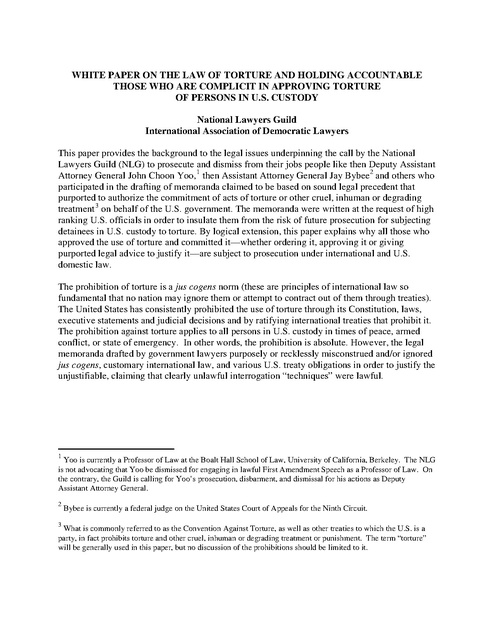


The debate about torture ramped up again last week with an account in the New York Review of Books about a secret International Red Cross report that was delivered to the CIA in February 2007. Faced with a court deadline in a Freedom of Information Act lawsuit regarding the memos filed by the ACLU, Justice lawyers asked for a two-week extension "because the memoranda are being reviewed for possible release." (White House, Justice and CIA spokesmen all declined to comment.) But the White House has sided with Holder. But current and former intel officials pushed back, arguing that any public release might still compromise "sources and methods." According to the administration official, ex-CIA director Michael Hayden was "furious" about the prospect of disclosure and tried to intervene directly with Obama officials. concluded there was no longer any reason to keep the interrogation memos classified. 22 banning such aggressive tactics, deputies to Attorney General Eric Holder Jr. Other officials predicted they would fuel demands for a "truth commission" on torture.īecause of an executive order signed by President Obama on Jan. One senior Obama official, who like others interviewed for this story requested anonymity because of the issue's sensitivity, said the memos were "ugly" and could embarrass the CIA. The memos, written by Justice Department lawyers in May 2005, provide the legal rationale for waterboarding, head slapping and other rough tactics used by the CIA. intelligence community, the White House is moving to declassify-and publicly release-three internal memos that will lay out, for the first time, details of the "enhanced" interrogation techniques approved by the Bush administration for use against "high value" Qaeda detainees. Subsequent action by either house may also be included in a schedule.Over objections from the U.S.


Schedules of amendments list amendments agreed to by the second house are communicated to the first house for consideration. For details about the outcome of proposed amendments please refer to either the Votes and Proceedings (House of Representatives) or the Journals (Senate). It supersedes the explanatory memorandum.Ĭirculated by members and senators when they propose to make changes to the bill. Revised explanatory memorandum: Accompanies and explains the amended version (third reading) of the bill.Supplementary explanatory memorandum: Accompanies and explains amendments proposed by the government to the bill.Explanatory memorandum: Accompanies and provides an explanation of the content of the introduced version (first reading) of the bill.As passed by both houses: Final text of bill agreed to by both the House of Representatives and the Senate which is presented to the Governor-General for assent.This version of the bill is then considered by the second house. Third reading: Prepared if the bill is amended by the house in which it was introduced.First reading: Text of the bill as introduced into the Parliament.


 0 kommentar(er)
0 kommentar(er)
